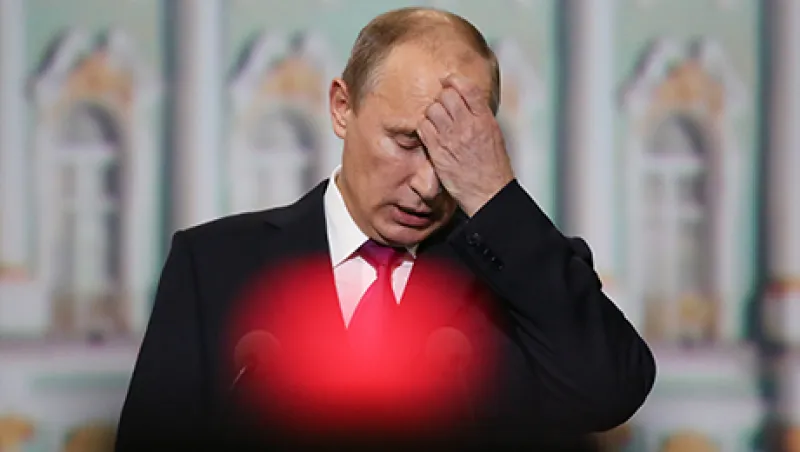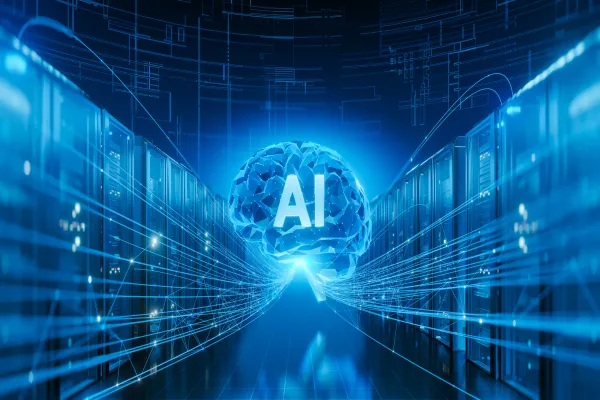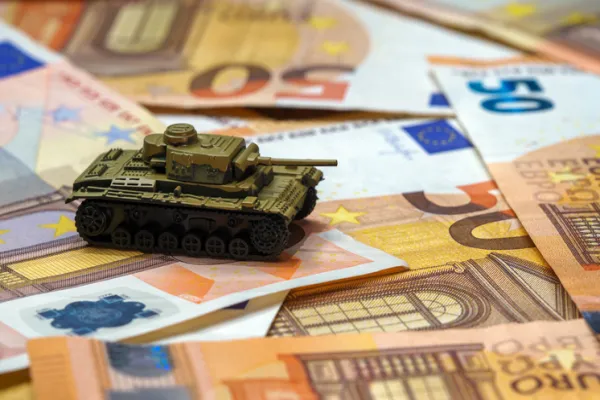When the Kremlin inaugurated the St. Petersburg International Economic Forum in 2006, Russia’s economy was growing at a sizzling 8.2 percent pace, thanks to soaring commodities prices, and the global capitalist elite flocked to the refurbished czarist capital in search of face time with President Vladimir Putin.
The backdrop for this year’s forum, May 22–24, could hardly be more different. Russia’s annexation of Crimea and perceived aggression in eastern Ukraine have been met with condemnation and economic sanctions by the U.S. and Western Europe, the country’s dominant sources of trade and investment. Although the sanctions have been largely symbolic, the hostile atmosphere sparked near-record capital flight of $50 billion from Russia in the first quarter of this year and put the economy on the tipping point of recession. Russian output contracted at a 0.5 percent pace in the first quarter after eking out growth of just 1.3 percent in 2013; according to the minister for Economic Development, Alexei Ulyukayev, there is a strong possibility of a “technical recession” in the second quarter.
The forum itself promises to have some conspicuously empty chairs. Wall Street kingpins like Goldman Sachs CEO Lloyd Blankfein, who played a featured role in better days, have signaled that they will skip this year’s conclave, apparently responding to a statement from the U.S. National Security Council that “high-profile appearances with Russian government officials would send an inappropriate message.” Some European business leaders with close ties to Russia have followed suit, including Joe Kaeser, CEO of the German industrial giant Siemens, who paid a controversial visit to Putin a week after the Crimean annexation, and CEO Claudio Descalzi of Italian oil producer Eni, which is teaming with Russia’s Gazprom to build the South Stream natural gas pipeline. The European Union has put that project on hold to protest Russia’s interference in Ukraine.
Still, multinational capital can hardly ignore Russia entirely. The country of 142.8 million now boasts the world’s seventh-largest economy with a gross domestic product of around $3.3 trillion on a purchasing power basis, according to the World Bank. It remains the largest producer of hydrocarbons and a vital supplier for Western Europe, with Russian gas alone representing 6 percent of the European Union’s energy consumption. Russia is also a burgeoning market for European companies despite its economic slowdown; EU exports jumped by one third between 2010 and 2012, to €213 billion ($281 billion).
Since the Ukraine crisis erupted in late February, Moscow has looked to drive a wedge between the U.S. government, which it regards as controlled by cold war reflexes, and an EU it sees as more pragmatic. The business community in Germany, Russia’s key European partner, has been particularly vocal in advocating dialogue over confrontation. “One has to wonder if someone like Putin shouldn’t have been included in the process much earlier, instead of waiting until it was too late,” Adidas CEO Herbert Hainer told the Wall Street Journal. The sporting equipment maker is a leading sponsor of soccer’s World Cup, which will be held in Russia in 2018. Top executives at Deutsche Bank, chemical maker BASF and automaker Volkswagen have added their own dovish views.
Moscow’s two-track diplomacy should bear some fruit in St. Petersburg. Mercedes-Benz is listed as the forum’s official car, and half a dozen European corporate chieftains are scheduled to participate in the “Global CEO Summit” that kicks off the forum, indicating the depth of the Continent’s long-term commitment to Russia across nations and sectors. The CEOs include Robert Dudley of U.K.-based oil giant BP; Frans van Houten of Dutch electronics producer Philips; and Patrick Kron of Alstom, the French maker of locomotives and power-generating equipment.
But the forum may be overshadowed by bigger news involving a previously neglected economic partner, China. Putin arrived in Shanghai on Tuesday for a meeting with Chinese leaders that he hopes will produce a series of trade deals. Success would decrease Russia’s dependence on Europe and give it more leverage in future political confrontations — and allow Putin to arrive triumphant in St. Petersburg.
The centerpiece of his Chinese agenda is finalizing a 30-year natural gas supply agreement, which Moscow and Beijing have haggled over since 2004. Days before Putin took off, Gazprom CEO Alexey Miller told Russian TV that an accord was “one digit away.”
The deal could substantially rebalance Gazprom’s revenue stream, 80 percent of which currently comes from sales to the EU. To strike a deal, however, the Russian gas giant is likely to have to offer concessions to China National Petroleum Corp., its state-owned partner in any agreement. Before the Ukraine conflict erupted, Gazprom reportedly was demanding a gas price of $14 per million BTUs, whereas CNPC was holding out for a price of just $10. The drawn-out negotiations have also stalled on how to share the estimated $27 billion cost of new pipelines and, perhaps the most sensitive point, how much to include China on future drilling projects within Russia. “I don’t think Russia will give away that much on price, but it might add more upstream assets for the Chinese side,” says Mattias Westman, founding partner of London-based Prosperity Capital Management, the largest manager of foreign money in Russia with more than $3 billion under management.
Russian officials have told local journalists they also hope to ink an agreement with China Railway Construction Corp. to help build a planned bridge, at a reported cost of up to 200 billion rubles ($5.8 billion), connecting southern Russia to Crimea (the annexed territory is a peninsula that connects to the European mainland only in Ukraine). Such a bridge would mark a political coup for Moscow, effectively endorsing its annexation, but the Chinese side has not confirmed the Russian reports. China has little economic interest in such a bridge, and Beijing has kept studiously neutral on Ukraine so far, abstaining on a U.N. Security Council Resolution condemning Crimea’s Russian-orchestrated independence referendum in March, rather than joining Russia in voting against it. If nothing else, the St. Petersburg forum will momentarily shift the spotlight back to one of Russia’s institutional strengths, a corps of highly competent economic policymakers who have steered the country from fragile bankrupt to fiscal and monetary powerhouse since Putin took power in 2000. Figures like Ulyukayev; Finance minister Anton Siluanov; and German Gref, CEO of dominant state bank Sberbank, have remained remarkably candid on the economic damage wrought by Russia’s Ukraine policy, despite intensive government propaganda supporting the Kremlin stance and pseudo-wartime pressure to rally around the flag. Former Finance minister Alexei Kudrin, the chief architect of Russia’s recovery, is also featured on several panels at St. Petersburg, despite the fact that he left the government in 2011 and frequently criticizes it.
It’s arguable that Putin has one ear open to this veteran economic brain trust and has moderated his policies in Ukraine as a result. The Kremlin has not invaded eastern Ukraine, a step many had feared, and it has turned a deaf ear to a request by the so-called People’s Republic of Donetsk, the self-proclaimed entity of activists who have seized official buildings across a dozen cities in that eastern region, to be annexed by Russia along the lines of the Crimean model. On the other hand, an estimated 40,000 Russian troops are still massed on Ukraine’s border, and state propaganda continues to lionize the pro-Russia insurgents and demonize the “fascist” revolutionary regime in Kiev.
Ironically, the best hope for Russia’s near-term economic future probably lies in Ukraine, specifically the presidential election that will take place there May 25, the day after the St. Petersburg forum wraps up. Moscow seems to be hoping that Petro Poroshenko, the front-runner, will claim victory and reach a political accommodation in the east, enabling Putin to retreat without loss of face.
Yet a broader conundrum remains. Russia has made a brazen show of strength over Ukraine, but in doing so it has exposed glaring weaknesses in its own economy. St. Petersburg is unlikely to produce any easy solutions.
Get more on emerging markets.






